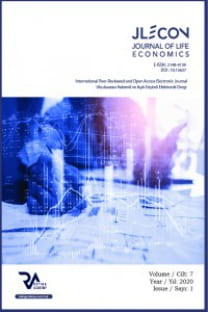THE RELATIONSHIP BETWEEN INCOME DISTRIBUTION AND DEVELOPMENT: THE CASE OF TURKEY
This study aims to determine whether income inequality in Turkey is an obstacle in economic development or not. For this purpose, the gini coefficient are used as a measure income inequality and real GDP is used as an economic growth indicator between the years of 1990-2015. Johansen cointegration method is utilized in the analysis of the study. Co-integration analysis has shown a longterm relationship between the gini coefficient and economic growth. In order to determine the direction of causality, the error correction model is applied. The findings indicate that the direction of causality runs from economic growth to gini coefficient. This result shows that economic growth is an important factor in the reduction of income inequality. Empirical result reveals also that the reduction of income inequality through economic growth is the crucial factor for Turkey’s economic development.
Anahtar Kelimeler:
Income distribution, economic development, income inequality, economic growth, Turkey
THE RELATIONSHIP BETWEEN INCOME DISTRIBUTION AND DEVELOPMENT: THE CASE OF TURKEY
This study aims to determine whether income inequality in Turkey is an obstacle in economic development or not. For this purpose, the gini coefficient are used as a measure income inequality and real GDP is used as an economic growth indicator between the years of 1990-2015. Johansen cointegration method is utilized in the analysis of the study. Co-integration analysis has shown a longterm relationship between the gini coefficient and economic growth. In order to determine the direction of causality, the error correction model is applied. The findings indicate that the direction of causality runs from economic growth to gini coefficient. This result shows that economic growth is an important factor in the reduction of income inequality. Empirical result reveals also that the reduction of income inequality through economic growth is the crucial factor for Turkey’s economic development.
___
- AHITUV, A. and MOAV, O., 2003, Fertility clubs and economic growth. In Eicher, T. S. & Turnovsky, S. J. (Eds.), Inequality and Growth: Theory and Policy Implications, 61-87. Cambridge, London: MIT Press.
- ALESINA, A. and PEROTTI, R., 1996, Income Distribution, Political Instability, and Investment, European Economic Review, 40(6), 1203-1228.
- ALESINA, A. and Rodrik, D., 1994, Distributive Politics and Economic Growth, Quarterly Journal of Economics, 109(2), 465-490.
- BARRO, R.J. and SALAI-MARTIN X., 1997, Technological Diffusion, Convergence, and Growth, Journal of Economic Growth, 2(1), 1-26.
- CASTELLO, A. and DOMENECH, R., 2002, Human Capital Inequality and Economic Growth: Some New Evidence, Economic Journal, 112(478), 187-200.
- CLARKE, G. R. G., 1995, More Evidence on Income Distribution and Growth, Journal of Development Economics, 47(2), 403-427.
- COLL, J. A. C., 2014, Inequality and Growth in the Context of the Mexian Economy: Does Inequality Matter for Growth, ECINEQ Working Paper Series, No. 2014-331.
- DAVIS, L. S., 2007, Explaining the Evidence on Inequality and Growth: Informality and Redistribution, The B.E. Journal of Macroeconomics, 7(1), 1-35.
- DUMLU, U., and Aydın, Ö., 2008, Ekonometrik Modellerle Türkiye İçin 2006 Yılı Gini Katsayısı Tahmini, Ege Akademik Bakış, 8(1), 373-393.
- FORBES, K. J., 2000, A Reassessment of the Relationship Between Inequality and Growth, American Economic Review, 90(4), 869-887.
- JOHANSEN, S., 1988, Statistical Analysis of Cointegration Vectors, Journal of Dynamics and Control, 12, 231-254.
- JOSTEN, S. D., 2004, Social Capital, Inequality, and Economic Growth, Journal of Institutional and Theoretical Economics-Zeitschrift Fur Die Gesamte Staatswissenschaft, 160(4), 663-680.
- KUZNETS, S., 1955, Economic Growth and Income Inequality, The American Economic Review, 45, 1-28.
- LEE, W. and ROEMER, J. E., 1998, Income Distribution, Redistributive Politics, and Economic Growth, Journal of Economic Growth, 3(3), 217-40.
- LEE, W. and ROEMER, J. E., 1998, Income Distribution, Redistributive Politics, and Economic Growth, Journal of Economic Growth, 3(3), 217-40.
- LI, H. and ZOU, H., 1998, Income Inequality is not Harmful for Growth: Theory and Evidence, Review of Development Economics, 2(3), 318-334.
- PANIZZA, U. (2002). Income inequality and economic growth: Evidence from American data, Journal of Economic Growth, 7(1), 25-41.
- PARTRIDGE, M., 1997, Is Inequality Harmful for Growth? Comment?. The American Economic Review, 87, 1019-1032.
- PEROTTI, R. (1993). Political equilibrium, income distribution and economic growth, Review of Economic Studies, 60(4), 755-776.
- PERSSON, T. and TABELLINI, G., 1994, Is Inequality Harmful for Growth, American Economic Review, 84(3), 600-621.
- PIKETTY, T., 2014, Yirmi Birinci Yüzyılda Kapital (Çeviren: Hande Koçak). Türkiye İş Bankası Kültür Yayınları, İstanbul.
- ROBINSON, S., 1976, A Note on the U Hypothesis Relating Inequality and Economic Development, American Economic Review, 66, 437-440.
- TUIK., 2016, Gelir ve Yaşam Koşulları Araştırması 2015, file:///C:/Users/User/Downloads/Gelir_ve_Ya%C5%9Fam_Ko%C5%9Fullar%C4%B1_Ara%C5%9Ft_21.09.2016.pdf (Access Date: 10 Ocak 2017).
- Yayın Aralığı: Yılda 4 Sayı
- Başlangıç: 2014
- Yayıncı: Rating Academy
Sayıdaki Diğer Makaleler
ÇEVRE SORUNLARI İLE MÜCADELEDE MALİYE POLİTİKALARI
Halil Kete, Mehmet Sadık Aydın, Hakan Kaya
KAMU ALTYAPI YATIRIMLARINDA KALİTE VE KAMU - ÖZEL ORTAKLIĞI
THE RELATIONSHIP BETWEEN INCOME DISTRIBUTION AND DEVELOPMENT: THE CASE OF TURKEY
RESILIENCE INDICATORS FOR MEASURING SUSTAINABLE ECONOMIC DEVELOPMENT
Sergii Burlutski, Svetlana Burlutski, Victoriya Margasova
POLİTİK BÜTÇE DÖNGÜLERİ VE TÜRKİYE’DE SEÇİMLER
ÇEVRE POLİTİKASININ EKONOMİK VE MALİ ARAÇLARI: ÇEVRE VERGİLERİ ÜZERİNE TEORİK BİR İNCELEME
Muhammed Yunus BİLGİLİ, Emrah FİRİDİN
KAMU ÖZEL ORTAKLIKLARI VE UYGULAMAYA İLİŞKİN BİR ANKET ÇALIŞMASI
